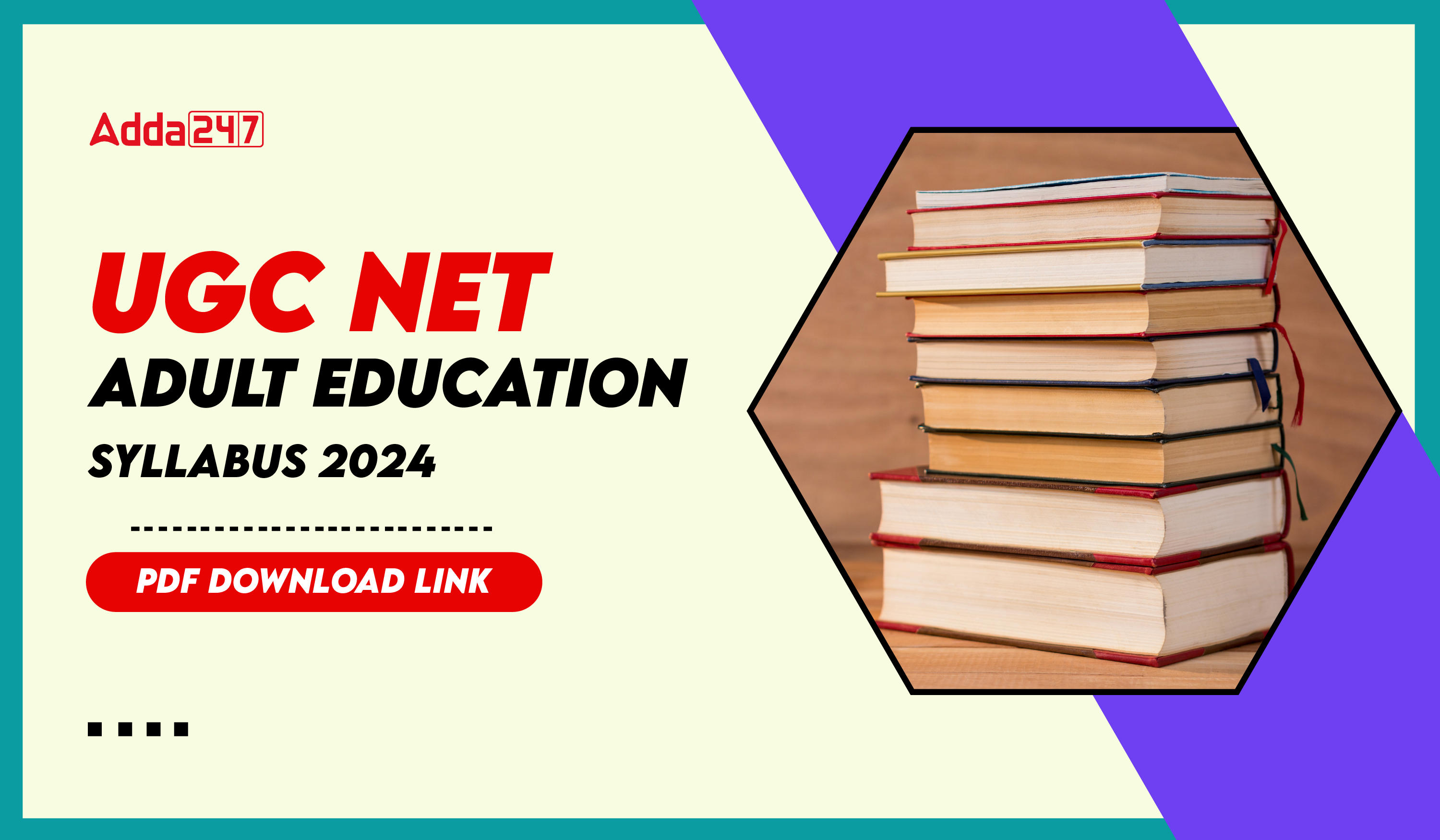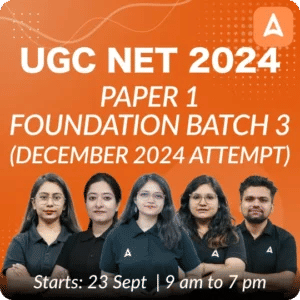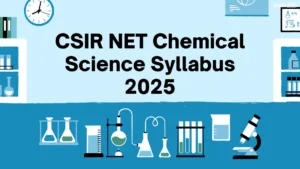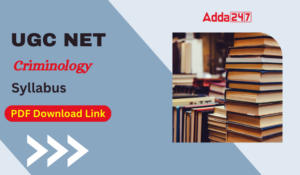Table of Contents
The UGC NET Syllabus has recently undergone updates by the exam authorities, with the National Testing Agency (NTA) now overseeing the examination via Computer-Based Testing (CBT), replacing the traditional pen-and-paper method. Comprising 10 units, the UGC NET Adult Education Syllabus delves into various facets of Adult Education. Proficiency in Adult Education will be evaluated in Paper II of the UGC NET exam. The syllabus for UGC NET Adult Education is accessible in both Hindi and English languages, ensuring inclusivity for a broader spectrum of candidates. For comprehensive details on the UGC NET Adult Education Syllabus, please consult the detailed overview provided below.
UGC NET Adult Education Syllabus & Exam Pattern
The syllabus for UGC NET Adult Education encompasses a broad spectrum of subjects crucial for comprehending population dynamics and demographic phenomena. UGC NET Syllabus covers key concepts including population theories, demographic transition, population structure, migration, fertility, mortality, family and household studies, population policies, and population projections.
Candidates are required to possess a profound grasp of demographic methodologies, data origins, and analytical methods employed in Adult Education. Furthermore, the syllabus underscores the interdisciplinary aspect of Adult Education by integrating perspectives from sociology, economics, geography, and public health. This integration offers a comprehensive comprehension of population dynamics and their societal and policy implications.
| Feature | Description |
|---|---|
| Exam Name | UGC NET |
| Number of Papers | 2 Papers |
| Paper I | General Aptitude |
| Paper I – Number of Questions | 100 |
| Paper I – Question Type | Objective (Multiple Choice, Matching, True/False, Assertion-Reasoning) |
| Paper I – Marks per Question | 2 |
| Paper I – Negative Marking | No |
| Paper II | Subject Concerned – Adult Education |
| Paper II – Number of Questions | 50 |
| Paper II – Question Type | Objective (Likely Multiple Choice) |
| Paper II – Marks per Question | 2 |
| Paper II – Negative Marking | No |
| Paper II – Duration | 1 hour |
| Syllabus | 10 Units covering Adult Education concepts, data analysis, trends, and policies |
| Minimum Qualifying Marks | No minimum marks for each paper |
UGC NET Adult Education Paper II Syllabus and Exam Pattern
The UGC NET exam is conducted to determine the eligibility of Indian lectures for Assistant Professor posts in universities and colleges. The UGC NET Adult Education Paper II syllabus and exam pattern encompass a diverse range of topics and assessment formats to gauge candidates’ knowledge and understanding in the field of Adult Education. The National Testing Agency (NTA) releases the syllabus and exam pattern for the UGC NET exam.
- Paper II is an objective-type question paper with 50 questions.
- Each question carries 2 marks.
- There is no negative marking for incorrect answers.
- The total duration of the paper is 1 hour.
UGC NET Adult Education Paper II Syllabus
Paper II of the UGC NET Adult Education exam covers ten units. Here’s a breakdown of the syllabus:
UGC Adult Education Unit 1: Adult, Continuing Education & Extension – Indian and Global Contexts
- Adult, Continuing Education: Pre And Post Independent India
- Adult Education Perspectives: Asian, Latin American, European and American.
- Extension Education and Services in India: Phases and Movements.
- Extension as “Third Dimension” of Higher Education, New approaches in Extension Education and Services in India, National Open school, Field organisation practices.
- Need, concept, types and characteristics of Lifelong Learning programmes in India
- Opportunities for Lifelong Learning and Extension.
- Agencies in Lifelong Learning in and outside India.
- Comparative Studies in Adult Education: Parameters, Trends and Analysis
UGC NET Adult Education Unit 2: Theoretical and Functional Base of Adult Education
- Liberal, Behaviouristic, Progressive, Humanistic, Radical and Analytical approaches of Adult Education.
- Social and educational perspectives of Tagore, Gandhi, Vivekananda, Radhakrishnan, Ambedkar and other Indian thinkers.
Andragogy and Pedagogy. - Attributes and distinctive features of adult learning and development.
- Motivational aspects of adult learning, values in Adult Education, and challenges of contemporary society.
- Individual Vs. Group learning approaches in Adult Education.
- Experiences and learning from agriculture, home science, community health and technology.
- Learning needs a diverse group of adult learners.
- Theories of adult learning Professionalization of adult education.
- Prior learning: Concept, issues and challenges, Equivalence and academic credit for continuing education courses
- Above are the topics covered in Unit 2 for UGC NET Adult Education Syllabus 2023
UGC NET Adult Education Unit 3: Alternate Learning Systems
- Education: Status, challenges and alternatives.
- Guidance and counselling: Individual and group counselling.
- Emergence of distance learning, autonomous learning and online learning.
- Transformational learning: Use of different media in education, ICT, World wide Web, Mobile technologies, multimedia packages, Computer Aided Learning (CAL), Audio-visual aids.
- Digital India, Swayam, MOOC courses, UDAAN, e-library.
- Virtual learners and virtual learning centres.
- ICT in handling information: storage, retrieval and dissemination of information.
- Online teaching, challenges and benefits of online learning.
- Differentiated instructions in an online environment
UGC NET Adult Education Unit 4: Curriculum Planning and Teaching – Learning Materials
- Meaning, definition of curriculum: need for curriculum, curriculum theory and practice.
- Identification of needs and interests of lifelong learners.
- Objectives of curriculum development
- Principles of curriculum development and its approaches.
- Curriculum planning: need and implementation.
- Evaluation: process-product-feedback mechanism.
- Curriculum development-supporting systems
- Teaching methods
- Teaching and learning materials and aids for Lifelong Learning.
- Preparation of books and audio visual material for neo-literates: processes, contents and field testing of materials.
- Agencies engaged in preparation of materials, type of teaching-learning materials: print, on-line and off-line.
UGC NET Adult Education Unit 5: Human Resource Management in Lifelong Learning and Extension
- Concept, principles and functions of management.
- Programme planning, organisation and control.
Job specifications of personnel engaged in University-community engagement, Skill development, Continuing education & other extension programmes. - Training and development: Family-based, Off the job & on the job.
- Training of functionaries in adults, continuing education, lifelong education through participatory approach.
- Skill development initiatives : State-promoted, NGO-promoted and Public Private Partnerships (PPP).
- Field skills, teaching methods of adults, training methods for training for functionaries
- Management of a training programme.
- Evaluation of social development programmes.
UGC NET Adult Education Unit 6: Communication for Social Development
- Concept, methods and practices of communication.
- Models: agriculture, community health, educational and social marketing.
- Modes of communication; conventional and ICT-driven.
- People’s participation in development.
- People’s organisation (community based organisation, state promoted organisation).
- Programmes: individual centric and group centric.
- Development communication planning and operationalization.
- Emerging technologies in communication for social development.
- Communication in extension: government, semi-government, nongovernment, corporate agencies etc.
UGC NET Adult Education Unit 7: Social and Developmental Concerns
- Development and its indicators, Millennium Development Goals (MDGs), Sustainable Development Goals (SDGs).
- Population Education: Concept and paradigm shifts.
- Social and distributive justice.
- Issues of marginalization and pedagogy: women, tribals, minorities, transgender, aged and persons with disability.
- Value based education.
- Inequality in the social system and social mobility.
- Interventions in specific concern areas of children, bonded labour and gender.
- Interventions in general areas of concern: water, health, energy, disaster and environment.
- Social and professional ethics.
UGC NET Adult Education Unit 8: Vocational Education and Skill Development
- Concept, scope, policy and programmes of vocational education and skill development.
- Market requirements and skilling status.
- Operationalization of the concept of vocational education in adult, continuing education and Lifelong Learning through state supported structures like Jan Shikshan Sansthan (JSS) and non state supported structures of Industrial and Business houses.
- Emergence of Micro-enterprises like Self Help groups and Mega-enterprises like SEWA.
- Skilling India: Skill sectors, National Skill Development policy, programme, and implementation mechanism.
- Structure of skilling programmes, certification and equivalence Make-In India, Start-up, Stand Up, Mudra Banks, Entrepreneurship
Analysis of such efforts at micro and mega level.
UGC NET Adult Education Unit 9: Research And Research Methods
- Philosophical Roots, history, elements and significance of social science research.
- Qualitative and quantitative action research
- Research Design: Meaning and Types; Descriptive, Analytical, Exploratary, Basic, Applied, Action, Survey and case study research.
- Sources of data: primary and secondary
- Collection of Secondary Data: Historical Documents, Archival Material, Published Sources, Journals, Internet Sources, Census, NSS and Statistical Reports.
- Population and Sampling, Data Collection and its tools, organisation of research, analysis, generalisation and report writing.
- Documentation and dissemination of the research work.
- Content Analysis, Survey and Case studies
- Current trends of research in adult and continuing education (national and international).
- Emerging areas of research in adult and continuing education and extension.
- Ethical concerns in social science research.
UGC NET Adult Education Unit 10: Lifelong Learning – The Futuristic Vision
- Beyond literacy and numeracy.
- Resolving the dilemmas of institutional and non-institutional learning.
- Localising the learning and cultural context of a learner.
- Harmonising the skill of individuals with the potential employers.
- Personalised and customised educational opportunities for adult learners.
- Network based learning.
- Open option based learning.
- Building learning communities.
- Search for an ever-evolving educational policy.
- Towards a learning society.
UGC NET Adult Education Syllabus PDF
The direct link to download the UGC NET Adult Education Syllabus PDF in Hindi and English Has been provided below. Candidate can download the UGC NET Adult Education Syllabus Paper I and Paper II PDF has been provided below.
| UGC NET Adult Education Syllabus PDF | |
| UGC NET Adult Education Syllabus In English | Click Here |
| UGC NET Adult Education Syllabus in Hindi | Click Here |
UGC NET Adult Education Paper II Marking scheme
The marking scheme for UGC NET Adult Education Paper II follows a standardized format. Each correct answer typically carries a weight of 2 marks. The UGC NET Adult Education Paper II follows a straightforward marking scheme:
| Description | Marks Awarded |
|---|---|
| Correct Answer | 2 marks |
| Incorrect Answer | 0 marks |
| No Answer/Unattempted | 0 marks |
UGC NET Adult Education Qualifying Marks
The minimum qualifying marks for UGC NET Adult Education Paper-II are determined by the National Testing Agency (NTA) or the respective exam conducting body. Typically, candidates are required to secure a minimum of 40% aggregate marks in Paper II to qualify for the UGC NET Adult Education Exam.
| Feature | Description |
|---|---|
| Qualifying Criteria | Combined Cut-off Percentile (Paper I + Paper II) |
| Cut-off Percentile Basis | Varies by Year, Subject, and Category |
| Strategy to Qualify | Score above the cut-off percentile for your category in the combined marks. |
| General Category indicative score for Paper II | Around 40% |
| Reserved Category indicative score for Paper II | Around 35% |
Advantages of UGC NET Adult Education Syllabus PDF
Here are some advantages of utilizing the UGC NET Adult Education Syllabus PDF. Candidates should review the following section to grasp the benefits of studying and comprehending the syllabus for the Adult Education subject as prescribed by the UGC NET. This will assist them in effectively utilizing the syllabus.
- Enhances understanding of the exam structure and syllabus: The UGC NET Adult Education Syllabus PDF outlines the topics included in the examination and their respective importance, aiding in the creation of a customized study schedule and highlighting key areas.
- Facilitates identification of crucial concepts and subjects: The comprehensive nature of the syllabus PDF covers all significant aspects of Adult Education, making it easier to identify areas for focused study.
- Promotes organized exam preparation: The division of the syllabus PDF into distinct units and topics allows for systematic study, ensuring thorough coverage of essential material.
- Streamlines the learning process, saving time and effort: Acting as a central source of information for the UGC NET Adult Education exam, the syllabus PDF eliminates the need to search multiple sources for relevant data.
- Authentic Information: Offers reliable information as it is published by the National Testing Agency (NTA), the authoritative body overseeing the UGC NET exam. Therefore, the syllabus PDF serves as a trustworthy reference for understanding the exam’s structure and content.




 CSIR NET Earth, Atmosphere, Ocean & ...
CSIR NET Earth, Atmosphere, Ocean & ...
 CSIR NET Chemical Science Syllabus 2025,...
CSIR NET Chemical Science Syllabus 2025,...
 UGC NET Criminology Syllabus 2025 PDF Do...
UGC NET Criminology Syllabus 2025 PDF Do...






